英语六上unit8__第3课时教学课件
AUnit8Atacampingtrip第三课时课件
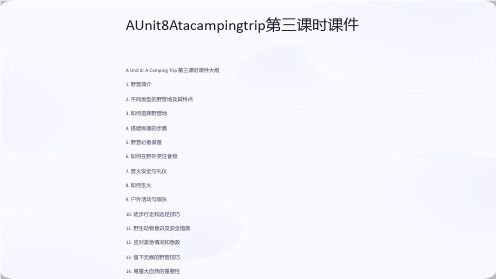
Mountain Camping
Experience breathtaking vistas and challenging hikes in the mountains. Ideal for adventure seekers and nature lovers.
Forest Camping
Immerse yourself in the tranquility of the woods, surrounded by lush greenery. Great for hiking, birdwatching, and peaceful retreats.
Introduction to Camping
Camping is a popular outdoor activity where people spend time away from their usual urban environment, often in the wilderness, to connect with nature and enjoy recreational activities.
and respect other campers.
surrounding vegetation.
How to Build a Fire
Follow these steps to build a campfire:
1
2 3
Gather Firewood
Collect dry firewood, including twigs, kindling, and larger logs.
CБайду номын сангаасmpfire Safety and Etiquette
Module8(课件)英语六年级上册
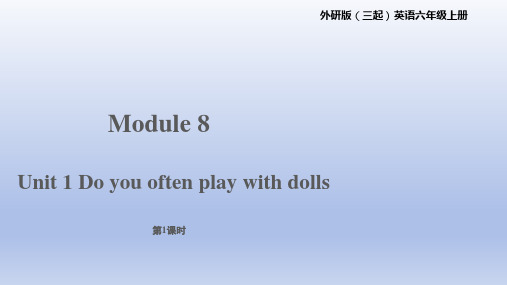
(B ) 2. _____ you often play with _____
A. Do; doll B. Do; dolls C. Does; dolls (B ) 3. I _____ a long time ago.
A (
)
A. stoped 4. There’s
a
B. stopped picture book
Let’s learn.
Presentatio n
频度副词 always usually often
sometimes never
词义 总是 通常 经常 有时候 从不
发生频率 100% 80% 60% 30% 0
Practic
Fill in the blanks withe“never, sometimes, often, always”.
Presentation
Lingling: Do you often take photos
Amy: Yes, I love taking photos. Do you
Lingling: No. But Daming has got a good camera. He often takes photos of me. Did he show you his photos in China
Presentatio Listen and chantn.
I’m always here. I never go. You’re sometimes here. You often go.
Presentatio Read the sentencens
Simon
I always ride my bike to school. I never go by bus.
2024年译林版英语六年级上册全册课件【完整版】

2024年译林版英语六年级上册全册课件【完整版】一、教学内容本课件基于2024年译林版英语六年级上册全册教材,详细内容包括:1. Unit 1: Public signs (第14课时)知识点:公共场所标识的认识,祈使句的运用章节内容:第1章公共标识,第2章祈使句2. Unit 2: Western festivals (第58课时)知识点:西方节日文化,一般将来时的运用章节内容:第3章西方节日,第4章一般将来时3. Unit 3: Habitats (第912课时)知识点:动植物的栖息地,现在进行时章节内容:第5章栖息地,第6章现在进行时4. Unit 4: Keep fit (第1316课时)知识点:健康生活,一般现在时的运用章节内容:第7章健康生活,第8章一般现在时二、教学目标1. 让学生掌握基本的公共标识,学会使用祈使句进行表达。
2. 了解西方节日文化,学会运用一般将来时描述节日活动。
3. 认识动植物的栖息地,掌握现在进行时的用法。
4. 培养学生的健康意识,学会用一般现在时描述生活习惯。
三、教学难点与重点1. 教学难点:祈使句、一般将来时、现在进行时、一般现在时的运用。
2. 教学重点:公共标识、西方节日文化、动植物的栖息地、健康生活。
四、教具与学具准备1. 教具:PPT课件、卡片、挂图等。
2. 学具:教材、练习册、彩笔、剪刀、胶水等。
五、教学过程1. 实践情景引入:通过展示公共场所的标识,引导学生学习祈使句。
2. 例题讲解:讲解祈使句的构成及用法,举例说明。
3. 随堂练习:让学生练习编写祈使句,并在实际场景中运用。
4. 情景剧:分组进行角色扮演,模拟公共场合使用祈使句。
5. 节日文化介绍:通过PPT展示,介绍西方节日,学习一般将来时。
6. 例题讲解:讲解一般将来时的构成及用法,举例说明。
7. 随堂练习:让学生练习描述节日活动,运用一般将来时。
8. 栖息地学习:展示动植物的栖息地图片,引导学生学习现在进行时。
译林英语六年级上册 Unit8 Chinese New Year第三课时赛课课件

To cook us something good.
Sound time
book cook
[u]
good
…
look
预习反馈
你能找出oo在这些单词中的发音并查找出其他相同发音的单词 么?比比谁找得多!
book cook good look classroom ______ ________ _______ ______ In Class 课上
light firecrackers stay up late or all night(守岁) keep fish for one night(留鱼) Chinese New Year’s Eve
New Year
On Chinese
New Year’s Eve On Chinese
New Year’s Day
I can read the story
I can act(表演) the story
译林小学英语六上
Unit 8
Chinese New Year
Sound time&Cartoon time
Give feedback and guess the topic
I
Before Chinese
Father Mother Grandparents have dinner with family
oo [u:]
Monster Nian runs away
It’s really cool!
On Chinese New Year’s Eve We’re going to have some food!
Sound time
[u]ห้องสมุดไป่ตู้
The cook is looking at a cookbook To look for something good. The cook is looking at a cookbook
Unit8Ourdreams(第3课时)课件

Read the should read many books.
My friend, Alan has a big
pIdwraeilalsmpsl.aHay ewgiistehvecrhqyilduinrtieecnrekwsthleeydn.(I对’mT…fr…eh感ee. 兴n趣)tinrmyaking
He would like to be a farmer some day. He will grow s and feed animals in the
garden at weekends.
All of us are dreams come
very true.
excited
aboeunt douirndgreams.
(快速阅读,给文章分段。) He must study hard now.
John, my other friend likes living in the country. He also likes animals very much.
He would like to be a farmer some day. He will grow s and feed animals in the
should read many books. I will play with children when I’m free.
My friend, Alan toys. He always
hthasinaksbihgodwretahme .btHooyesdiswyvoerrky.
人教版(五四制)六年级英语上册Unit8_SectionB(1a-2c)课件

Task3 Listen to the conversation and fill in the blanks. (听力填空)
P: That sounds boring . Hmm…Let’s play soccer! Do you have a soccer ball? J: No, I don’t. P: Oh. Well, do you have a basketball ? J:Yes. I do. Let’s play basketball! P: That sounds fun !
Draw pictures that show something interesting, boring, fun, difficult or relaxing. Then show the pictures to your classmates and let them guess which of the five words the pictures show.
Task1 Read the passage fast and silently to find the general idea.
The main idea of the passage is about___C______. A. School things B. A soccer ball C. A survey about who has a soccer ball
Task2 Listen to the specific ideas. ( 听取细节) Listen and check description words you hear.
Listen and fill in the blanks.
play computer games play volleyball watch TV play basketball
湘少版小学六年级英语上Unit 8 We shouldn't waste water 第三课时 教案
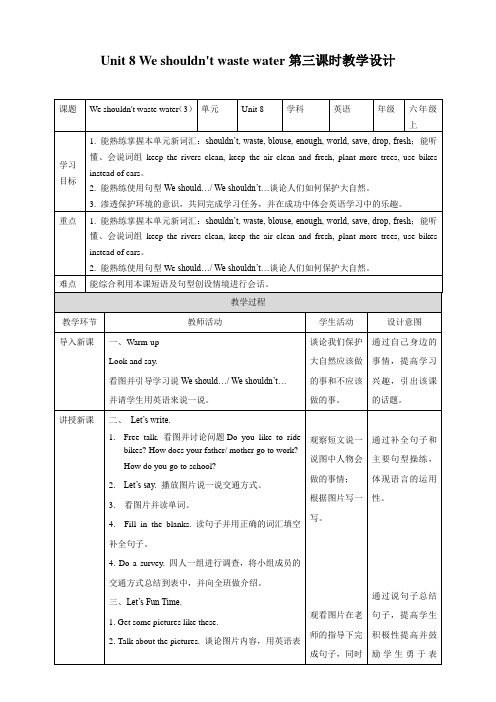
Unit 8 We shouldn't waste water第三课时教学设计
达。
3. Work in groups. Design a poster. Use the words “should” and “shouldn’t”.并将正确句子总结下来。
注意模仿语音
语调。
积极配合老师
和同伴完成练
习。
现。
使用本课重点句
型及短语写一写
说一说,巩固并
提高写作能力。
通过练习,巩固
本课词汇和句
型。
课堂小结这节课的教学任务目标主要是学生巩固本单元的重点句型。
通过听说读写的形式,反复练习使
学生熟练掌握句型;组织各种活动来巩固句型,使
学生学习兴趣浓厚;在轻松的课堂气氛下,达到预
定的教学目标。
板书Unit 8 We shouldn't waste water
We should…
We shouldn’t…。
牛津译林版英语六年级上册Unit 8《Chinese New Year》公开课课件

have dinner with family中小学课件站
eat dumplings
Ticking time : 能说出与春节相关的1个或2个句子,得★ ★, 能说出与春节相关的3个或3个以上句子,得★ ★ ★。 能帮助组内成员学习,加★。
中小学课件站
Chinese New Year is coming . Su Hai gets an email from her e-friend Anna in Hong kong (香港).
is going to make some
and
.
On Chinese New Year’s Eve ,
is going to
and buy some
.
with family ,
On Chinese New Year’s Day ,
and watch
.
is going to get
On the second day
tangyuan
have dinner some flowers
Anna is going to
red packets a lion dance
Anna is going to
fireworks
Anna is going to
中小学课件站
Ticking time : 填空完全正确,得★ ★ ★ , 有1、2个错误,得★ ★ , 有3、4个错误,得★, 帮助小组成员学习,加★。
is going to watch
.
中小学课件站
excited buy many things
firecrackers eat dumplings
have dinner
六年级上册英语八课

外研版英语六年级上册Module 8Unit 1 Do you often tidy your bed ?1.Look , listen and say .I tidied my room and I found a coin .You should tidy your room every day . Then you’ll find a coin every day ! 2.Listen , read and ac out .Lingling : What are you doing , Amy ?Amy :I am tidying Tom’s bed .Lingling : Let me help you .Amy: Thank you .Lingling : Does he ever tidy his bed ?Amy : No , he doesn’t .Lingling : Do you often tidy your bed ?Amy : Yes , every day . I can sleep well in a tidy bed .Lingling :I know . Do you often tidy your desk ?Amy :No, I don’t . It is very messy . I can’t find my books.Lingling :I will help you , Amy . I will tidy your desk .Amy :Thank you .Lingling : Now your desk is tidy . What do you want to do now ?Amy:Let’s read!Lingling : Good idea ! Do you often read stories ?Amy:Yes . I read stories every day .Unit 2 I often read English books1.Listen and chant .I am always here .I never go .You’re sometimes here .You often go .2.Listen and read .Maomao : I never play football. I don’t like it .Lili:I sometimes clean the blackboard for my teachers .Gerry : I love English . I often read English books .Simon :I always ride my bike to school. I never go by bus .。
六年级上册英语教案-Unit8Weshouldn'twastewater第三课时湘少版(三起)
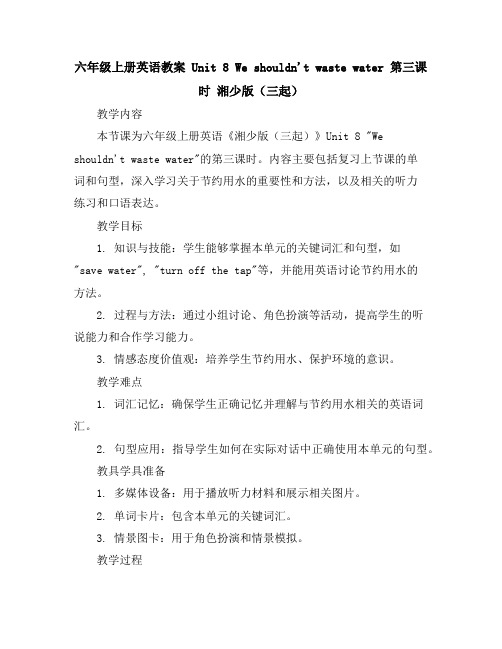
六年级上册英语教案 Unit 8 We shouldn't waste water 第三课时湘少版(三起)教学内容本节课为六年级上册英语《湘少版(三起)》Unit 8 "Weshouldn't waste water"的第三课时。
内容主要包括复习上节课的单词和句型,深入学习关于节约用水的重要性和方法,以及相关的听力练习和口语表达。
教学目标1. 知识与技能:学生能够掌握本单元的关键词汇和句型,如"save water", "turn off the tap"等,并能用英语讨论节约用水的方法。
2. 过程与方法:通过小组讨论、角色扮演等活动,提高学生的听说能力和合作学习能力。
3. 情感态度价值观:培养学生节约用水、保护环境的意识。
教学难点1. 词汇记忆:确保学生正确记忆并理解与节约用水相关的英语词汇。
2. 句型应用:指导学生如何在实际对话中正确使用本单元的句型。
教具学具准备1. 多媒体设备:用于播放听力材料和展示相关图片。
2. 单词卡片:包含本单元的关键词汇。
3. 情景图卡:用于角色扮演和情景模拟。
教学过程1. 课堂导入:通过播放一段关于节约用水的短片,激发学生的兴趣。
2. 复习环节:快速复习上节课的单词和句型,确保学生掌握。
3. 新内容学习:介绍新词汇和句型,通过例句和情景模拟帮助学生理解。
4. 小组活动:学生分组讨论如何节约用水,并用英语表达出来。
5. 听力练习:播放相关听力材料,检查学生对新内容的理解程度。
6. 角色扮演:学生进行角色扮演,模拟实际对话场景。
板书设计1. 关键词汇:在黑板上列出本单元的关键词汇,如"save water", "turn off the tap"等。
2. 句型展示:展示本单元的重要句型,如"We shouldn't waste water"。
译林版(三起)六年级上册英语教案:Unit8ChineseNewYear第3课时
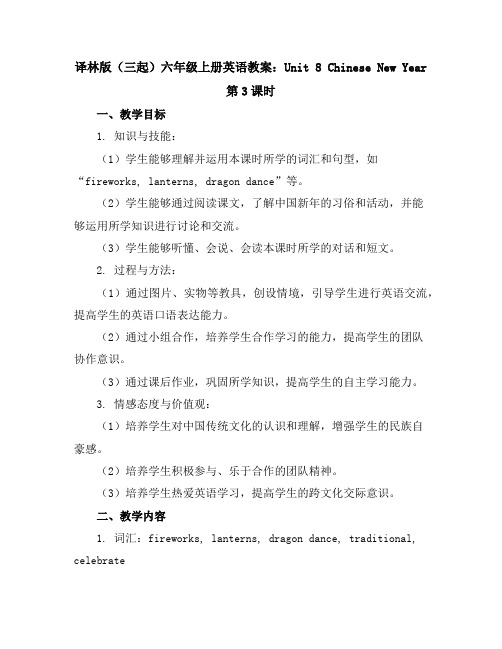
译林版(三起)六年级上册英语教案:Unit 8 Chinese New Year第3课时一、教学目标1. 知识与技能:(1)学生能够理解并运用本课时所学的词汇和句型,如“fireworks, lanterns, dragon dance”等。
(2)学生能够通过阅读课文,了解中国新年的习俗和活动,并能够运用所学知识进行讨论和交流。
(3)学生能够听懂、会说、会读本课时所学的对话和短文。
2. 过程与方法:(1)通过图片、实物等教具,创设情境,引导学生进行英语交流,提高学生的英语口语表达能力。
(2)通过小组合作,培养学生合作学习的能力,提高学生的团队协作意识。
(3)通过课后作业,巩固所学知识,提高学生的自主学习能力。
3. 情感态度与价值观:(1)培养学生对中国传统文化的认识和理解,增强学生的民族自豪感。
(2)培养学生积极参与、乐于合作的团队精神。
(3)培养学生热爱英语学习,提高学生的跨文化交际意识。
二、教学内容1. 词汇:fireworks, lanterns, dragon dance, traditional, celebrate2. 句型:We celebrate Chinese New Year with fireworks and dragon dance. Traditional activities are important during Chinese New Year.3. 对话:关于中国新年庆祝活动的讨论。
4. 短文:介绍中国新年的传统习俗和活动。
三、教学重点与难点1. 教学重点:(1)掌握本课时所学的词汇和句型。
(2)能够运用所学知识进行讨论和交流。
(3)能够听懂、会说、会读本课时所学的对话和短文。
2. 教学难点:(1)词汇的发音和用法。
(2)句型的正确运用。
(3)短文的理解和复述。
四、教具与学具准备1. 教具:图片、实物、PPT等。
2. 学具:课本、练习册、文具等。
五、教学过程1. 导入:通过图片或实物,引导学生复习上一课时所学知识,为新课做好铺垫。
(湘少版)六年级英语上册 《Unit8第三课时》说课稿

(湘少版)六年级英语上册《Unit8第三课时》说课稿一、课程背景本节课是《湘少版》六年级英语上册第八单元的第三课时。
该单元的主要内容是介绍不同节日的传统和庆祝方式,让学生了解不同文化之间的差异和共同点。
该课程以“Dragon Boat Festival”为主题,重点介绍中国端午节的历史和传统。
二、学习目标1.通过听、说、读、写四种语言技能,学生能够了解并掌握端午节的历史和传统。
2.学生能够正确掌握本课时所涉及的词汇及短语。
3.学生能够运用所学知识,制作简单的节日手工作品。
4.学生能够培养对中华文化的了解和兴趣。
三、教学重点1.as well as结构的用法。
2.熟悉端午节的历史和传统。
3.运用所学知识,制作简单的节日手工作品。
四、教学难点1.使用as well as结构表达连续性的关系。
2.掌握端午节的历史和传统及相关生词。
五、教学过程1. 导入(5分钟)(1)播放一段短视频,介绍端午节的由来和庆祝方式。
(2)引导学生了解端午节的主题。
(3)激发学生对节日的兴趣,引导学生向家长或祖辈了解端午节的传统和庆祝方式。
### 2. 学习新课(30分钟)(1)一起学习第三单元的单词和短语,并对生词进行解释和巩固。
(2)通过听取教师的讲解、答题和小组讨论的方式,让学生掌握端午节的历史和传统。
(3)以小组合作形式,制作简单的端午节手工制品,培养学生的动手能力。
### 3. 任务实践(10分钟)要求学生利用所学知识,模仿端午节庆祝活动的场面,进行口语表达。
### 4. 课堂小结(5分钟)教师通过简单核对学生制作的端午节手工制品,评价学生在本节课上的动手能力,及对中华文化的理解。
六、教学方法探究式教学,情境教学,合作式学习法,分组讨论法,综合实践教学。
七、教具准备电脑、投影仪、短片、毛笔、墨汁、纸张、面粉、糯米粉、豆沙馅等。
八、教学反思本节课思路清晰,重点突出,注重实践。
在端午节的两种经典庆祝活动——赛龙舟和吃粽子中,采用了学习单词、学习语法、听取讲解、采用分组讨论、互相借鉴等多种手段,让学生对端午节有了更深刻的了解,并巩固了相关的单词和语法知识。
(湘少版)六年级英语上册 《Unit8第三课时》教案设计
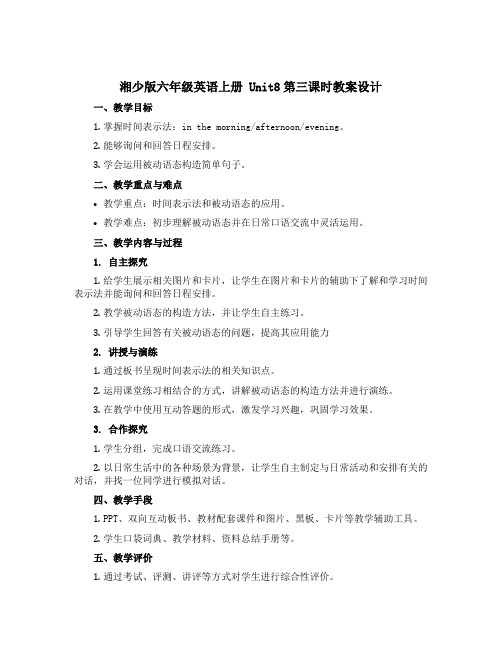
湘少版六年级英语上册 Unit8第三课时教案设计一、教学目标1.掌握时间表示法:in the morning/afternoon/evening。
2.能够询问和回答日程安排。
3.学会运用被动语态构造简单句子。
二、教学重点与难点•教学重点:时间表示法和被动语态的应用。
•教学难点:初步理解被动语态并在日常口语交流中灵活运用。
三、教学内容与过程1. 自主探究1.给学生展示相关图片和卡片,让学生在图片和卡片的辅助下了解和学习时间表示法并能询问和回答日程安排。
2.教学被动语态的构造方法,并让学生自主练习。
3.引导学生回答有关被动语态的问题,提高其应用能力2. 讲授与演练1.通过板书呈现时间表示法的相关知识点。
2.运用课堂练习相结合的方式,讲解被动语态的构造方法并进行演练。
3.在教学中使用互动答题的形式,激发学习兴趣,巩固学习效果。
3. 合作探究1.学生分组,完成口语交流练习。
2.以日常生活中的各种场景为背景,让学生自主制定与日常活动和安排有关的对话,并找一位同学进行模拟对话。
四、教学手段1.PPT、双向互动板书、教材配套课件和图片、黑板、卡片等教学辅助工具。
2.学生口袋词典、教学材料、资料总结手册等。
五、教学评价1.通过考试、评测、讲评等方式对学生进行综合性评价。
2.利用学生应用自主听、说、读、写等全面评价方式,对学生进行综合能力评估。
六、教学反思与改进1.适应学生的审美和兴趣,调整教学方案,加强互动性和趣味性。
2.持续改进教学质量,通过学生反馈、教师评估、课堂活动效果等方式,不断提高教学水平。
精选 Unit8 SectionAGrammar Focus 3c优教精品完整教学课件PPT (2)
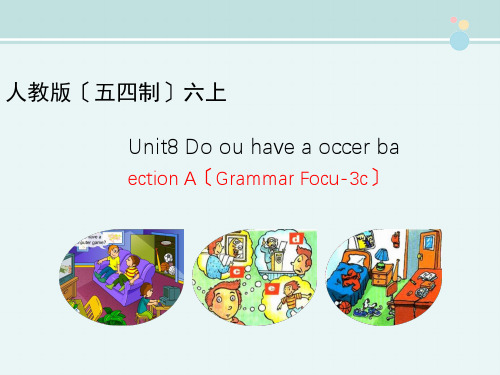
et’ ractice
3b Fi in the ban with do or doe A: ___D_o_e____ ohn have a occer ba B: No, he __d_o_e_n_’t____ A:_D_o_e____ he have a m … et’ a doe
et’ ractice 3b Fi in the ban with do or doe
2 他有一个儿子吗?不,他没有。
—__D__o_e___ he ___h_a_v_e___ a on —No, he ___d__o_e_n_’_t
3 他们打球吗?
___D_o____ the ____a_____ baetba
4 咱们踢足球吧。
___e_t_’____a__________ occer
I he the ou we he it Eric
do
I the ou we
doe
he he it Eric
et’ ractice 3b Fi in the ban with do or doe
A: __D__o__ ou have a baeba B: e, I _____d_o_ A: Great! I have a bat et’ a
Do they have a baseball? Yes, they do./No, they don’t. They have a volleyball.
1〕第一、第二人称单复数,以及第三人称复数作主语时
,用_d__o__构成一般疑问句,答复用_d_o_或构成一般疑问句,答 复用_d_o_e_或___d_o_e_n_’_t___
Eercie
一、用have/ha填空 A I__h_a_v_e_ a baeba B he ___h_a a baetba C ohn ___h_a_ a mother____ a ring
- 1、下载文档前请自行甄别文档内容的完整性,平台不提供额外的编辑、内容补充、找答案等附加服务。
- 2、"仅部分预览"的文档,不可在线预览部分如存在完整性等问题,可反馈申请退款(可完整预览的文档不适用该条件!)。
- 3、如文档侵犯您的权益,请联系客服反馈,我们会尽快为您处理(人工客服工作时间:9:00-18:30)。
“我的职业理想”游戏 一位同学时用准备好的道具表演相关职 业的典型动作,老师提问:“What does he do?”其他学生回答:“He’s a…”。
Language use 假定一位新同学来到班里,他从各个方面接 触同学们。今天大家在一起谈论各自家庭的 照片。这时新同学很想了解同学爸爸的职业。 你们帮他俩编创一个询问并介绍爸爸的职业 的对话吧!
At the beginning,… Then,… After that,…
观看课文动画并大声跟读
Yes or No?
( ) Class Three had a New Year's party. ( ) They had the party on October 31 st. ( ) Everything wasn’t ready at seven o’clock. ( ) There were many gifts and colorful lights in the classroom. ( ) Li Shan and Wu Chen acted a short play at the beginning. ( ) Liu Zhaoyang’s joke made everyone laugh. ( ) The students sang Happy New Year finally. ( ) The games made everyone excited. ( ) The party was great.
No, he isn’t.
I’m a teacher. Is your father a teacher, too?
Is he a farmer? No, he’s a postman.
Jim is telling Gao Wei something about his father’s job. Guess what does his father do?
观看动画,模仿回答
询问职业的其他句型 1. What’s your job? 你是做什么工作的?
What’s his/ her job? 他/她是做什么工作的?
2. What do you do?你是做什么工作的? What does he/ห้องสมุดไป่ตู้she do?他/她是做什么工作
的?
He is cool! 他真酷!
陕旅版英语六年级上册 Unit8 New Year’s Party
第3课时
Part B Let’s learn more Part C Order and act
教学目标:
1. 能听懂、理解Let’s learn more部分的短文,并能 模仿录音中的语音语调流利地朗读课文。 2. 能在实际生活中准确运用一般过去时态描述并谈 论有关新年聚会的相关内容;并能根据所学词汇进 行替换练习,做到活学活用。 3. 培养学生英语阅读的正确方法和习惯,鼓励小组 间的合作学习。
Part C Order and act
2 6 3
4 5
人教新版四年级上册
Review
Brother, brother, this is my brother. I love my brother.
Sister, sister, this is my sister. I love my sister.
He is a farmer.
postman
My father is a postman.
观看动画,学习表演
Practice
情景表演 Kate正在和朋友谈论家人的职业,她该如何询 问朋友家人的职业呢?这时就可以时用句型: What does your…do? 例如:What does your brother do?
Brother, sister, we play together.
This is Liu Xing’s family. You can ask Liu Xing “Who’s this?”
She is my mother.
She is my sister.
He is my father.
He is my brother.
cool一般用在口语中,表示某人打扮时髦、动 作潇洒或表示感叹“棒极了”。 例如:Your father is cool!你爸爸太酷了!
cool也可以表示天气情况,意为“凉爽的”。 例如:It’s cool today. 今天很凉爽。
teacher
My mother is a teacher.
farmer
Let’s sing
Play a game
Verbs group
PK Past tense verbs group
Let’s learn more
➢Q1: What did Class One do? ➢Q2: What can you see in the classroom?
Practice—句子接龙
